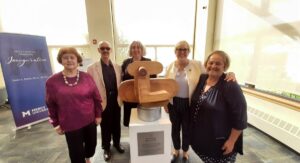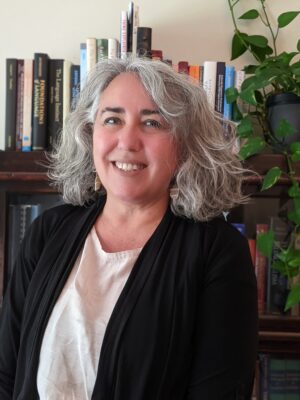New name, new president, same access to education for all

In approving Mercy College’s name change to Mercy University on Aug. 22, the New York State Board of Regents was only acknowledging what Mercy has long since been, said new President Susan L. Parish, Ph.D., M.S.W.
“The New York State Board of Regents approved this name change in recognition of the breadth of Mercy’s programs at the undergraduate and graduate levels, across a wide variety of disciplines, including business, health professions, education, social sciences, communications and the arts,” she said in a statement then.
Parish, who became Mercy’s 13th president on July 1, elaborated on this when we sat down to talk with her and Eva M. Fernández, Ph.D., provost and vice president for academic affairs, recently at Verrazano Hall, the university’s Georgian-style administration building overlooking the Hudson River on the Dobbs Ferry campus. In addition to bachelor’s and master’s degrees and certification in the various fields, Mercy also offers a doctorate in physical therapy. Courses are conducted in six schools on three campuses – in Dobbs Ferry; the Hutchinson Metro Center in the Bronx, a Simone Development Cos. property; and Manhattan’s Herald Square – as well as online.
The School of Nursing, which opened July 1, reflects Mercy’s, and higher education’s, commitment to training the next generation of health-care workers in a post-pandemic era that has seen that profession struggle to maintain staffing. It is no surprise then that the university should select Parish as president, a woman whose education and résumé in public health, dedication to research and can-do attitude toward life led her to academia. (See sidebars.)
A critical juncture
Arriving at Mercy at a critical moment when the United States Supreme Court had struck down affirmative action and was about to ban the Biden Administration’s plan to ease student loan forgiveness, Parish, along with Provost Fernández, spoke passionately about the need to make higher education more affordable for American students, whose indebtedness ($1.77 trillion, according to LendingTree.com) has broader implications for their families, their purchasing power and the economy.
“We need to double and triple the Pell Grants,” Parish said of the federal awards to undergraduates who demonstrate exceptional need and haven’t yet received a bachelor’s, graduate or professional degree.
Colleges and universities also have a part to play, she and Fernández added, by keeping tuition costs down – Mercy has one of the lowest tuitions in New York state ($20,018 undergraduate yearly); ensuring students get the most out of transfer credits so that they are not paying for unnecessary courses; and offering work-study programs and paid internships.
“We prepare teachers through a Rockland BOCES (Board of Cooperative Educational Services) residency program, and I’d love to do more with hospitals,” Fernández said – a possibility, Parish added, that Mercy has been exploring with White Plains Hospital, part of the Montefiore Health System.
Access for all
“Mercy has always been a school for students who haven’t had access to college,” Parish said. It was founded as a junior college for women by the Sisters of Mercy in 1950, a time when many women still didn’t go on to higher education. (The school became a four-year college in 1961; independent, nonsectarian and coeducational over the next half-decade; added graduate programs, beginning with one in nursing, in 1981; and has since the 1990s been a pioneer in online study, with entire degrees available online.)
Today, the university has 6,379 undergraduates – 69.1% of whom identify as female; 46.1% as Hispanic (a 10% increase in the last seven years); 24.6% Black, 18.5% White, 5.3% Asian and 2.4% multiracial. Almost three-quarters (74%) of all first-time, full-time undergraduates received Pell Grants, while 56% of all undergraduate-degree and certificate students were awarded Pell Grants. The graduate-student composition is somewhat different, with 79.6% of the 2,236 students identifying as female; 36.6% White; 28.2% Hispanic, 21% Black; 9.6% Asian; and 2.5% multiracial. (Mercy also offers academic programming for high school students and individuals incarcerated at Sing Sing Correctional Facility in Ossining.)

With 911 faculty members – to go along with 509 staffers and an operating budget of $171.6 million last year – Mercy has a student-faculty ratio of 15:1.
The school is particularly celebrated for its commitment to Hispanic students in a state with the fourth biggest Latino population. As the largest, private nonprofit Hispanic Serving Institution (HSI) in New York, Mercy partnered with Excelencia in Education, a Latino higher education advocacy organization, to glean new information on Latino college completion and enrollment trends across the United States. The result, “Latino College Completion: United States 2023,” found a comparatively large gap in college completion rates for Latino students and suggested ways for ensuring these students advance. Mercy is among the top institutions in New York state for that advancement, ranking 19th in enrolling and 10th in graduating Latinos.
In speaking of her hopes for these and other students today, Parish recalled meeting with the first graduating class of four-year Mercy College – the Class of 1965. Many of them told her, “Mercy gave me the opportunity to go to college.”
It’s a sentiment, she, Hernández and their team want to continue to hear for years to come.
For more, visit mercy.edu.
Susan L. Parish, Ph.D., M.S.W., president of Mercy University
“You’re going to love her”: That’s the first thing everyone says when you tell them you’ll be interviewing Susan L. Parish, Ph.D., M.S.W., who became Mercy University’s 13th president on July 1, with the official inauguration on Sept. 22.
And indeed, she is a warm, outgoing woman, one who matter-of-factly acknowledges that she “fell into” academia.
A graduate of Rutgers University, where she earned a Bachelor of Arts in English literature and a Master of Social Work; and the University of Illinois at Chicago, where she got her Ph.D. in public health; Parish completed a National Institutes of Health (NIH)-funded postdoctoral fellowship at the Waisman Center, University of Wisconsin-Madison, and has garnered more than $13 million in research funding from federal, state and foundation sources as she plumbed the health and well-being of individuals with disabilities and their families. Her efforts have led to numerous honors, including a Lifetime Achievement Award from the American Public Health Association Disability Section (2021). She’s a fellow of the American Association on Intellectual and Developmental Disabilities and the Society of Social Work and Research. (Parish also sits on the boards of the Westchester County Association and the Commission on Independent Colleges and Universities.)
It was an ongoing passion for research in the fields of disabilities and caregiving that led her to fall into teaching – and in love with it. Parish was offered a position as an assistant professor of social work at the University of North Carolina-Chapel Hill. Being the kind of person who says “yes” to life’s opportunities, she took the post, which led her to become the first Nancy Lurie Marks professor of disability policy at Brandeis University, where she directed the Lurie Institute for Disability Policy. As dean of the Bouvé College of Health Sciences at Northeastern University in Boston, she developed a physician assistant leadership program with the American Academy of Physician Assistants.
Prior to becoming Mercy University’s president, Parish was dean of the College of Health Professions and the Sentara professor of health administration at Virginia Commonwealth University, a public research institution in Richmond.
At a time when the arts and humanities are under siege in college curricula for not being financially practical, Parish remains committed to them and walks the talk. She enjoys art and theater as well as travel and kayaking – perfect for someone whose life is now centered in a village overlooking the Hudson River.

Eva M. Fernández, provost and vice president of academic affairs, Mercy University
Was it mere coincidence, or a harbinger of things to come, that Eva M. Fernández, Ph.D., should attend the Academy of Our Lady of Mercy, Lauralton Hall, which was founded in 1905 in Milford by the Sisters of Mercy – the same order that would found what is now Mercy University, where she is provost and vice president of academic affairs?
Growing in up in neighboring Fairfield in a bilingual home, the Madrid-born Fernández would bridge her Spanish birthplace and American surroundings. She has continued to be a bridge – studying and then teaching linguistics and championing opportunities for those groups that have not always had a seat at the educational table. When she became provost and vice president of academic affairs at Mercy on July 1 of last year, then-President Tim Hall described her as “a passionate advocate for social justice and student success.”
Fernández came to Mercy from Guttman Community College, City University of New York (CUNY), where she served as interim vice president for academic affairs and provost from August 2021. Prior to Guttman, Fernández spent 21 years at Queens College (CUNY), becoming tenured in 2007 and a full professor in 2015. There she balanced teaching with administrative roles, culminating in her work as associate provost for innovation and student success.
Fernández was also a liaison between Queens College and the wider world – advising visiting graduate students and faculty from Brazil and Japan; and lecturing in Brazil, Russia and throughout the United States.
With a Bachelor of Arts degree in linguistics (German) from New York University, where she graduated magna cum laude, and a Master of Arts and Ph.D. in the same subject from CUNY Graduate School and University Center, Fernández has published widely in the field, including the textbook “Fundamentals of Psycholinguistics.” as well as nearly 40 scholarly articles, book chapters and a monograph. She has been an adviser to a host of community and professional organizations in the U.S. as well as in Brazil, Japan, Spain, Portugal and Italy.